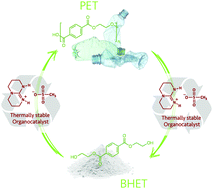当前位置:
X-MOL 学术
›
Green Chem.
›
论文详情
Our official English website, www.x-mol.net, welcomes your
feedback! (Note: you will need to create a separate account there.)
Organocatalysed depolymerisation of PET in a fully sustainable cycle using thermally stable protic ionic salt
Green Chemistry ( IF 9.3 ) Pub Date : 2018-02-02 00:00:00 , DOI: 10.1039/c7gc03396f Coralie Jehanno 1, 2, 3, 4, 5 , Irma Flores 1, 2, 3, 4, 5 , Andrew P. Dove 6, 7, 8, 9 , Alejandro J. Müller 1, 2, 3, 4, 5 , Fernando Ruipérez 1, 2, 3, 4, 5 , Haritz Sardon 1, 2, 3, 4, 5
Green Chemistry ( IF 9.3 ) Pub Date : 2018-02-02 00:00:00 , DOI: 10.1039/c7gc03396f Coralie Jehanno 1, 2, 3, 4, 5 , Irma Flores 1, 2, 3, 4, 5 , Andrew P. Dove 6, 7, 8, 9 , Alejandro J. Müller 1, 2, 3, 4, 5 , Fernando Ruipérez 1, 2, 3, 4, 5 , Haritz Sardon 1, 2, 3, 4, 5
Affiliation

|
The world's plastic production is continuously and exponentially increasing, creating millions of tons of short-lived items that end as waste and accumulate in the environment. Poly(ethylene terephthalate) (PET) provides one of the best examples as it is a non-biodegradable polymer that is mainly used as raw material for a wide range of packaging applications, making degradation of PET a subject of great interest for researchers. Herein we report a sustainable process for the chemical recycling of PET from waste to a new polymer using an innovative protic ionic salt. Using a simple solvent-free process, post-consumer PET bottles are degraded into bis(2-hydroxyethyl) terephthalate (BHET) monomer. The catalyst, formed by an equimolar quantity of triazabicyclodecene (TBD) and methanesulfonic acid (MSA), completely depolymerises PET in less than 2 h, producing 91% of highly pure BHET. Due to the unusual thermal stability of the TBD : MSA salt, the catalyst can be recycled at least 5 times to depolymerise more PET waste. In addition, we demonstrate that the monomer obtained from the degradation reaction can be used to synthesise new PET with similar thermal properties to that produced using a conventional polycondensation method. The protic ionic salt catalyst combines the excellent catalytic ability of organocatalysts with the thermal stability of metal catalysts, resisting degradation up to >400 °C, thus for the first time presenting an industrially-relevant organocatalyst for high-temperature polymer degradation and recycling.
中文翻译:

使用热稳定的质子离子盐,在完全可持续的循环中进行有机催化的PET解聚
世界塑料产量正在持续增长并呈指数增长,产生了数百万吨的短寿命物品,这些物品最终以废物的形式存在并在环境中积累。聚对苯二甲酸乙二酯(PET)提供了最好的例子之一,因为它是一种不可生物降解的聚合物,主要用作各种包装应用的原材料,这使PET的降解成为研究人员非常感兴趣的主题。本文中,我们报告了使用创新的质子离子盐将PET从废物化学循环利用到新聚合物中的可持续过程。使用简单的无溶剂工艺,将消费后的PET瓶降解为对苯二甲酸双(2-羟乙基)酯(BHET)单体。由等摩尔量的三氮杂双环癸烯(TBD)和甲磺酸(MSA)形成的催化剂,在不到2小时的时间内使PET完全解聚,产生91%的高纯BHET。由于TBD:MSA盐具有非同寻常的热稳定性,因此该催化剂可循环使用至少5次,以解聚更多的PET废料。另外,我们证明了由降解反应获得的单体可用于合成具有与使用常规缩聚方法所产生的热性质相似的热性质的新的PET。质子离子盐催化剂将有机催化剂的出色催化能力与金属催化剂的热稳定性相结合,可抵抗高达> 400°C的降解,因此首次提出了工业上适用的有机催化剂,可用于高温聚合物的降解和再循环。催化剂可以循环使用至少5次以解聚更多的PET废料。另外,我们证明了由降解反应获得的单体可用于合成具有与使用常规缩聚方法所产生的热性质相似的热性质的新的PET。质子离子盐催化剂将有机催化剂的出色催化能力与金属催化剂的热稳定性相结合,可抵抗高达> 400°C的降解,因此首次提出了工业上适用的有机催化剂,可用于高温聚合物的降解和再循环。催化剂可以循环使用至少5次以解聚更多的PET废料。另外,我们证明了由降解反应获得的单体可用于合成具有与使用常规缩聚方法所产生的热性质相似的热性质的新的PET。质子离子盐催化剂将有机催化剂的出色催化能力与金属催化剂的热稳定性相结合,可抵抗高达> 400°C的降解,因此首次提出了工业上适用的有机催化剂,可用于高温聚合物的降解和再循环。我们证明了从降解反应中获得的单体可用于合成具有与传统缩聚方法生产的热性能相似的热性能的新型PET。质子离子盐催化剂将有机催化剂的出色催化能力与金属催化剂的热稳定性相结合,可抵抗高达> 400°C的降解,因此首次提出了工业上适用的有机催化剂,可用于高温聚合物的降解和再循环。我们证明了从降解反应中获得的单体可用于合成具有与传统缩聚方法生产的热性能相似的热性能的新型PET。质子离子盐催化剂将有机催化剂的出色催化能力与金属催化剂的热稳定性相结合,可抵抗高达> 400°C的降解,因此首次提出了工业上适用的有机催化剂,可用于高温聚合物的降解和再循环。
更新日期:2018-03-20
中文翻译:

使用热稳定的质子离子盐,在完全可持续的循环中进行有机催化的PET解聚
世界塑料产量正在持续增长并呈指数增长,产生了数百万吨的短寿命物品,这些物品最终以废物的形式存在并在环境中积累。聚对苯二甲酸乙二酯(PET)提供了最好的例子之一,因为它是一种不可生物降解的聚合物,主要用作各种包装应用的原材料,这使PET的降解成为研究人员非常感兴趣的主题。本文中,我们报告了使用创新的质子离子盐将PET从废物化学循环利用到新聚合物中的可持续过程。使用简单的无溶剂工艺,将消费后的PET瓶降解为对苯二甲酸双(2-羟乙基)酯(BHET)单体。由等摩尔量的三氮杂双环癸烯(TBD)和甲磺酸(MSA)形成的催化剂,在不到2小时的时间内使PET完全解聚,产生91%的高纯BHET。由于TBD:MSA盐具有非同寻常的热稳定性,因此该催化剂可循环使用至少5次,以解聚更多的PET废料。另外,我们证明了由降解反应获得的单体可用于合成具有与使用常规缩聚方法所产生的热性质相似的热性质的新的PET。质子离子盐催化剂将有机催化剂的出色催化能力与金属催化剂的热稳定性相结合,可抵抗高达> 400°C的降解,因此首次提出了工业上适用的有机催化剂,可用于高温聚合物的降解和再循环。催化剂可以循环使用至少5次以解聚更多的PET废料。另外,我们证明了由降解反应获得的单体可用于合成具有与使用常规缩聚方法所产生的热性质相似的热性质的新的PET。质子离子盐催化剂将有机催化剂的出色催化能力与金属催化剂的热稳定性相结合,可抵抗高达> 400°C的降解,因此首次提出了工业上适用的有机催化剂,可用于高温聚合物的降解和再循环。催化剂可以循环使用至少5次以解聚更多的PET废料。另外,我们证明了由降解反应获得的单体可用于合成具有与使用常规缩聚方法所产生的热性质相似的热性质的新的PET。质子离子盐催化剂将有机催化剂的出色催化能力与金属催化剂的热稳定性相结合,可抵抗高达> 400°C的降解,因此首次提出了工业上适用的有机催化剂,可用于高温聚合物的降解和再循环。我们证明了从降解反应中获得的单体可用于合成具有与传统缩聚方法生产的热性能相似的热性能的新型PET。质子离子盐催化剂将有机催化剂的出色催化能力与金属催化剂的热稳定性相结合,可抵抗高达> 400°C的降解,因此首次提出了工业上适用的有机催化剂,可用于高温聚合物的降解和再循环。我们证明了从降解反应中获得的单体可用于合成具有与传统缩聚方法生产的热性能相似的热性能的新型PET。质子离子盐催化剂将有机催化剂的出色催化能力与金属催化剂的热稳定性相结合,可抵抗高达> 400°C的降解,因此首次提出了工业上适用的有机催化剂,可用于高温聚合物的降解和再循环。











































 京公网安备 11010802027423号
京公网安备 11010802027423号